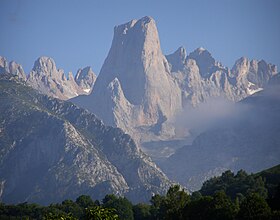Picos de Europa
| Picos de Europa | |
|---|---|
| English: Peaks of Europe | |

Naranjo de Bulnes -Picu Urriellu- seen from Pozo de la Oración, Cabrales, Asturias.
|
|
| Highest point | |
| Peak | Torre de Cerredo |
| Elevation | 2,650 m (8,690 ft) |
| Coordinates | 43°11′51″N 04°51′06″W / 43.19750°N 4.85167°W |
| Dimensions | |
| Area | 646 km2 (249 sq mi) |
| Naming | |
| Etymology | Europe |
| Geography | |
| Country | Spain |
| State/Province | Iberian Peninsula |
| Range coordinates | 43°12′N 4°48′W / 43.200°N 4.800°WCoordinates: 43°12′N 4°48′W / 43.200°N 4.800°W |
| Parent range | Cantabrian Mountains |
| Geology | |
| Type of rock | limestone |
The Picos de Europa (literally: "Peaks of Europe", often abbreviated in English to the Picos) is a range of mountains 20 km inland from the northern coast of Spain, in the Autonomous Communities of Asturias, Cantabria and Castile and León; they are part of the Cantabrian Mountains. A widely accepted origin for the name is that they were the first sight of Europe for ships arriving from the Americas.
The range consists of three major massifs: Central (also known as Urrieles), Eastern (Ándara) and Western (also known as the Picos de Cornión). The Central and Western massifs are separated by the 1.5 kilometres (0.93 mi) deep Cares Gorge (Garganta del Cares), with the village of Caín at its head. The waters in the Cares mostly arise from cave resurgences. Some of the water in the Cares river is diverted through a hydroelectric scheme, with a canal running in the northern wall of the gorge to Camarmeña. An access path next to the canal provides a spectacular walk.
Almost all of the rock in the Picos is limestone, and glacial action has contributed to create an impressive area of alpine karst. The highest peak is Torre de Cerredo, with an altitude of 2,650 metres at 43°11′51″N 4°51′06″W / 43.19750°N 4.85167°W. Many other peaks reach altitudes of over 2,600 m. The area is popular with mountaineers, climbers and mountain walkers. There is a good network of well-established mountain refuges. The best-known climbing site is the Naranjo de Bulnes or Picu Urriellu, in the Urrieles massif which can be considered the most famous climb in Spain.
...
Wikipedia

